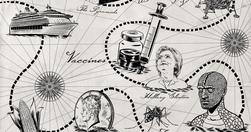Relevant Overviews
- Communication Strategy
- Content Strategy
- Online Strategy
- Online Community Management
- Social Media Strategy
- Content Creation & Marketing
- Online Architecture
- Digital Transformation
- Innovation Strategy
- Communications Tactics
- Psychology
- Productivity
- Social Web
- Media
- Politics
- Communications Strategy
- Science&Technology
- Business

Confirmation bias is usually described as a tendency to notice or search out information that confirms what one already believes, or would like to believe, and to avoid or discount information that’s contrary to one’s beliefs or preferences. This presidential election was undoubtedly the most contentious of any in the memory of most voters... Th…

“Capgras delusions,” ... the belief that loved ones have been replaced by identical imposters... the brain has separate modules for analyzing the cognitive aspects of recognition, and for feeling the emotional aspects of familiarity... these functional fault lines in the social brain... have given rise to the contemporary Facebook generation... …

when people are confronted with moral dilemmas, they do indeed respond differently when considering them in a foreign language than when using their native tongue.

In many cases, incompetence does not leave people disoriented, perplexed, or cautious. Instead, the incompetent are often blessed with an inappropriate confidence, buoyed by something that feels to them like knowledge... being in “search mode” on the Internet helps people feel smarter, despite their searches resulting in nothing due to filters blo…

Barb's job is to convince us that this simple system of thought can account for the messiness of many of our personal and interpersonal relationships, regardless of gender, race, class, age, language, education... Type is intensely democratizing in its vision of the world, weird and wonderful in its commitment to flattening the material diffe…
Cognitive ease is the concept of which when you hear something repeatedly, your brain starts to form connections around it, thus making it easier for you to process later. And since we prefer things to be simple and easy, things that are easy to think about generally makes us feel happier... for newspapers it’s part of the problem that we all face…

what product designers do to your mind. They play your psychological vulnerabilities (consciously and unconsciously) against you in the race to grab your attention. I want to show you how they do it.... The “most empowering” menu is different than the menu that has the most choices... When we wake up in the morning and turn our phone over to see a…

The American media, over the past year, has been trying to work out something of a mystery: Why is the Republican electorate supporting a far-right, orange-toned populist with no real political experience, who espouses extreme and often bizarre views? ... his support seems to cross demographic lines ... does surprisingly well from the Gulf Coast o…

“In 40 years,” Morton added, “as many people will believe a bunch of Arabs knocked down the World Trade Center as will believe that Lee Harvey Oswald acted alone.”
In which I studiously avoid curating anything about 2016 or David Bowie.

Thinking, Fast and Slow is a best-selling[1] 2011 book by Nobel Memorial Prize in Economics winner Daniel Kahnema...: his early days working on cognitive biases, his work on prospect theory, and his later work on happiness.The book's central thesis is a dichotomy between two modes of thought: "System 1" is fast, instinctive and emotional; "System …

the idea that everyone is like us is called the “false-consensus bias.”... Online it means we can be blindsided by the opinions of our friends or, more broadly, America... morphs into a subconscious belief that we and our friends are the sane ones and that there’s a crazy “Other Side” ... that just doesn’t “get it,” ... not as intelligent as “us.”…

Over 40 new resources ... some great longreads to enjoy as the nights grow long, the productivity tips you’ll need to find the time to read them, and a free set of steak knives. The Christmas season, after all, is almost upon us.

Remind me to buy this guy's books: "There is no way by which events can be directly recorded in our brains; they are experienced and constructed in a highly subjective way, different in every individual, differently reinterpreted or reexperienced whenever recollected. . . . Frequently, our only truth is narrative truth, the stories we tell each…
Relevant Overviews
- Communication Strategy
- Content Strategy
- Online Strategy
- Online Community Management
- Social Media Strategy
- Content Creation & Marketing
- Online Architecture
- Digital Transformation
- Innovation Strategy
- Communications Tactics
- Psychology
- Productivity
- Social Web
- Media
- Politics
- Communications Strategy
- Science&Technology
- Business